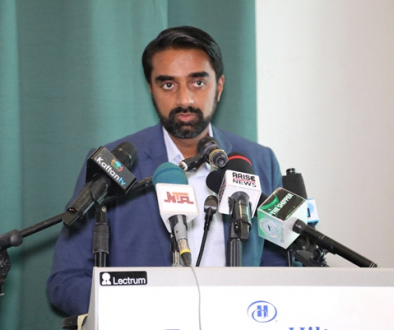Core Civil Society Issue with the Proposed NGO Bill by Cynthia Akpomudiare
 The bill proposed is titled: An Act to Regulate the Acceptance and Utilisation of Finance/Material Contributions of Donor Agencies to Voluntary Organisations and for matters connected therewith. In the words of Mr Chidi Odinkalu, former Chairman of the National Human-Rights Commission, the proposed bill on NGO Regulation sponsored by the Deputy Majority Leader of the Federal House of Representatives, Hon. Umar Buba Jibril, is “…stunning in its audacity, far reaching in its scope and a danger to elective government in Nigeria.”
The bill proposed is titled: An Act to Regulate the Acceptance and Utilisation of Finance/Material Contributions of Donor Agencies to Voluntary Organisations and for matters connected therewith. In the words of Mr Chidi Odinkalu, former Chairman of the National Human-Rights Commission, the proposed bill on NGO Regulation sponsored by the Deputy Majority Leader of the Federal House of Representatives, Hon. Umar Buba Jibril, is “…stunning in its audacity, far reaching in its scope and a danger to elective government in Nigeria.”
The bill seeks to establish a commission to oversee all activities including approval of funds for Civil Society Organisations, other non-governmental organisations and individuals who receive international funding for different programs such as sustainable development, public office holder accountability, good governance, improvement of access to quality healthcare services, polio eradication and HIV/AIDS care and control in Nigeria among others. In a nutshell, to regulate all voluntary sector acceptances and disbursements of funds from local and international donor agencies.
The motivation for such a commission appears to be coming from great confusion in the minds of those behind the bill as to what NGOs (Non-Governmental Organizations) and CSOs (Civil Society Organizations) are set-up to do. The chief proponent of the bill has premised the rationale for the bill on the idea that NGOs and CSOs are voluntary organisations that are registered “to partner with the government at all levels” to fill gaps wherever they exist. Yes, perhaps some non-profits help to extend the reach of government at all levels in the mode of service providers (for example into hard to reach communities and within some core sectors such as education and health). Very often in this mode, those organisations are funded by, and espouse similar aims and objectives with the government. Could this be the sum of the experience the proponents of this bill have of NGOs and CSOs prompting their assertion that “…they are supposed to be partners in progress with the government and therefore in need of a commission to regulate their activities?”
There are however other non-profits that are completely independent of government in their funding but who may share some aims and objectives around which they are prepared and indeed, do collaborate with government to achieve shared but heightened impact. A good number of these would rather “die” than take a penny from government. There is also a third group that remains financially independent from government and do not as a matter of principle collaborate with government because their existence is largely to protest the inefficiencies and ineffectiveness of government as they are set up to call government out and point to alternatives that are being missed and suggest reasons why government may be missing obvious opportunities to improve the lives and livelihoods of citizens. A collaboration with government will become a snare for them and dilute their mandate.
The proponents of the NGO bill in their confusion around these three basic typologies have lumped all groups together in suggesting “…for them to carry out their activities, the NGOs and CSOs solicit for funds from all over the world and collect billions of naira on behalf of Nigerians!” These “billions” they now want a commission to regulate. A serving senator of the APC, Shehu Sani, has vowed to fight the bill when it comes to the Senate. “The bill on NGOs will reinforce those with tyrannical tendencies and further stifle rights to freedom of speech and assembly. I’ll oppose it,” he tweeted.
George Ter Ayua commented that once this bill scales through, NGOs employment method will change and the usual interference of recommendation from MPs and senators will begin. NGOs are the only organisations in this country that according to him, the politicians have not dominated for themselves.
The Social Development Integrated Centre (Social Action), a civil society group, released a press statement urging the House of Representatives to vote against the bill. In its press statement, the SDIC said that as much as it was against terrorism, it did not support the destruction of democratic structures in the guise of combating terrorism. The group noted that there were laws already governing the utilisation of money obtained by civil society organisations and it was the job of government to enforce these laws. “There are extant laws which regulate civil society organisations, making it possible for these organisations to be held accountable for the utilisation of their funds.
In addition to these laws, are policies such as the Central Bank of Nigeria, CBN, policy which makes it mandatory for all NGOs to be registered with the Special Control Unit against Money Laundering, SCUML, and comply with its rules,” SDIC pointed out. It asked that NGOs and voluntary organisations not be made to suffer, under the pretence of enacting a new law to tackle terrorism. The group also pointed out that the strength of the NGOs was based on the fact that they were independent of the government.
A member of the NDIC, Ken Henshaw, has described the bill as “obnoxious and horrific.”
“The bill poses a threat to the freedom of civil society organisations. It is a covert threat to our right to free speech, and by extension, a threat to the sustenance of democracy in Nigeria,” Mr. Henshaw who was a former president of the National Association of Nigerian Students, NANS, said.
But the Catholic groups have commented that the bill could be Mr. Umar’s “subtle way of promoting and protecting his religion (Islam).” In a statement by their national director, Evaristus Bassey, the groups – Caritas Nigeria, and Justice, Development and Peace Commission, JDPC – accused Mr. Jibril of ”trying to promote Islam through the bill.”
The groups said “such bills that seem to put the Federal House of Representatives on a face-off with citizens only portray the House as intent on protecting a ‘Lootocracy’ that should not be questioned, hence the intent on muzzling NGOs. This bill is not in the interest of the House itself. “We would advise that in the light of all the deep concerns expressed by well-meaning citizens, the National Assembly drops all attempts to legislate on NGOs and allow NGOs originate such legislation themselves as private member’s bill.”
The debate continues: Is this really a bill to promote transparency and accountability in the voluntary sector, or is this a cynical attempt to muzzle independent thought within the polity?


